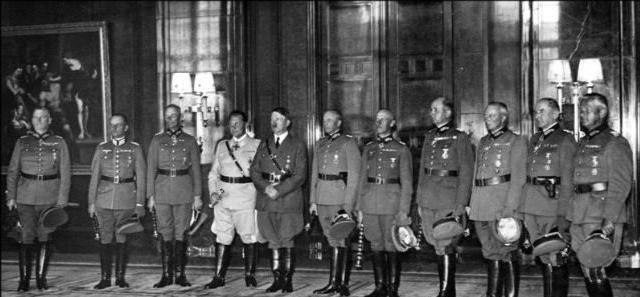What is history: it is the echo of the past to the future, the reflection of the future on the past. - Hugo
The Battle of Kiev in World War II was the largest encirclement and annihilation war in human history, Nazi Germany blitzed the Soviet Union, resulting in the Soviet Red Army's nearby annihilation of near Kiev, creating a miracle in the history of world wars, however, it was this battle that led to the reversal of the Soviet-German War and even World War II, which became an important reason for Germany's ultimate defeat.
What's going on here?

On June 22, 1941, Nazi Germany launched project Barbarossa to blitz the Soviet Union.
The Red Army was caught off guard at the beginning of the war and was rapidly broken through by the armored forces of Nazi Germany, and the Red Army was wiped out of a large number of troops and destroyed a large number of technical equipment in the early stages of the war.
According to statistics, only a few days after the Soviet-German war began, the Soviet Red Army lost nearly four thousand warplanes, as well as tens of thousands of artillery and tanks.
For example, the Battle of Minsk was fought for only half a month, but the Soviet Red Army killed more than 80,000 people, missed more than 50,000 people, captured nearly 300,000 people, and the entire Western Front Army was destroyed!
Under the lightning offensive of Nazi Germany, the Soviets were unable to stop an effective defense, and on July 7, 1941, the German army launched an attack on the Ukrainian town of Kiev, and the famous "Battle of Kiev" began.
The Germans quickly broke through the defensive positions around Kiev and detoured to the rear of the Soviet army, which wanted to organize an effective resistance, but it was too late.
On 16 September 1941, the German guderian and von Kleist's armored unit met in the rear of Kiev, symbolizing the complete encirclement of Kiev.
In the encirclement, there were at least 550,000 Soviet Red Army, which was almost the entire Southwestern Front (at that time the whole of the Soviet Union generally maintained five to six fronts)!
In the face of the German lightning offensive, Stalin initially refused a breakthrough by the Soviets in Kiev, and later the order was modified, but by this time it was too late.
The five or six hundred thousand Soviet Red Army troops in the encirclement have been unable to escape.
On September 26, 1941, after a brutal and fierce battle, the Battle of Kiev ended.
The Soviet Southwest Front was completely destroyed, and the commander of the Front and the entire command organ were completely destroyed!
As many as 665,000 Soviet troops were captured, which was the largest and most tragic siege in human history!
But why was it that such a victory, which should have gone down in history, became an important reason for the defeat of Nazi Germany?
It turned out that in order to encircle the Soviet Southwestern Front, Hitler mobilized the Gudri armored troops who had planned to attack Moscow to the south!
Guderian's Second Panzer Army was the elite of the Panzer Corps of Nazi Germany, the vanguard of blitzkrieg and one of Hitler's most valued units.
Initially, Guderian's forces were subordinate to the German Army Group Center and were responsible for the main offensive in the direction of Moscow.
At the beginning of the Soviet-German War, Guderian's armored corps was invincible, breaking all the way to the Soviet military town of Smolensk, and in early August, annihilating the Soviet Red Army Army Group Smolensk and reinforcements.
Had Hitler made a slight addition to Guderian at this time and made a surprise attack on Moscow before winter came, Stalin, who had not yet had time to organize an effective defense in Moscow, would probably have lost his capital.
But Hitler once again made a fatal mistake: he ordered Guderian to abandon his attack on Moscow and instead go south for the Battle of Kiev!
Although Guderian's southward march strengthened the military strength of southern Germany and annihilated the Soviet Southwestern Front, it was precisely in the nearly two months that Guderian went south that Stalin dispatched troops and built strong defensive positions around Moscow, and at the same time mobilized a large number of fresh troops and reserves to participate in the defense of Moscow.
Guderian initially refused to go south, but he could not resist the orders of the Supreme Commander. When Guderian finished the Battle of Kiev and returned to the Northern Front at the end of September to advance towards Moscow, he found that the weather was already extremely bad, and the elite troops of the Soviet Red Army in the Far East and the newly formed defensive forces were constantly emerging, and finally, the Nazis defeated Moscow!
The Germans underestimated the tenacity and organizational mobilization potential of the Soviets, who suffered nearly 30 million casualties during the Soviet-German war, but the Soviets mobilized more than 10 million regular troops and 40 million reserves.
Faced with the Soviet Union's strong human resources and strong mobilization capabilities, the qualitative superiority of the German army was greatly offset.
The only way for Nazi Germany to win the war against the Soviet Union was to seize power over the vast majority of the elite areas of the western Soviet Union within the first six months of the campaign, and time was undoubtedly the most precious treasure to realize this strategic intention.
But many of Hitler's military commanders were a waste of time, and Moscow was undoubtedly more political and strategic than in the direction of Kiev.
As postwar Western military commentators put it: "The Germans won the greatest war of annihilation in the history of war, but lost the greatest war in the history of war." ”
The Battle of Kiev changed human history to some extent.